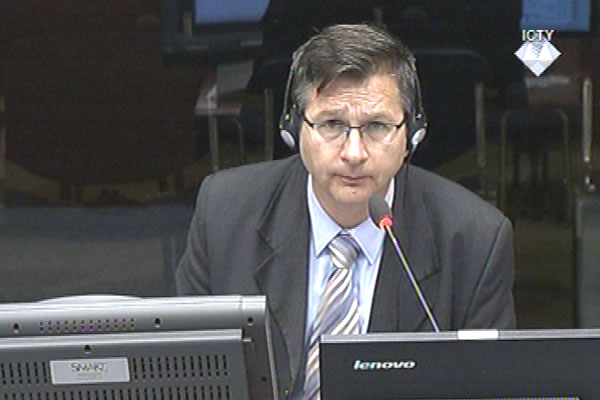Home
DIFFICULTIES UNDERSTANDING CRIMINAL PROCEEDINGS
Milos Kovic, historian giving evidence at the request of Mladic’s defense, didn’t contest the claim that the crimes had been perpetrated against non-Serbs in the Serb part of BH. He did complain, however, that no one discussed crimes against Serbs. The judges explained to Kovic that the Trial Chamber did not intend to write ‘the history of the entire war’ but to render a ‘judgment to one particular accused’
 Milos Kovic, defence witness at Rako Mladic trial
Milos Kovic, defence witness at Rako Mladic trial Continuing the cross-examination of Milos Kovic, prosecutor Arthur Traldi tried to prove that the Bosnian Serb leadership headed by Radovan Karadzic and Ratko Mladic wanted to achieve an ethnically clean Serb state in the BH territory. The objective was implemented in the course of the war through crimes and ethnic cleansing of the non-Serbs, the prosecutor argued. Kovic, a history expert called by Mladic’s defense, thinks that the creation of the Serb state in BH was an expression of the legitimate ‘democratic will’ of the people. In Kovic’s view, that objective was not pursued through ethnic cleansing.
In one of his expert reports Kovic contested the findings of the prosecution expert Robert Donia on the siege of Sarajevo. Kovic stressed that the US historian did not try to find a deeper meaning to General Ratko Mladic's words at an Assembly meeting in April 1995; Mladic told the deputies, ‘You know what happened when Markale was hit. But I can tell you that I have never in my life been as badly criticized as I was for Markale…’ Donia interpreted it as an admission of responsibility for the artillery attack on the Sarajevo town marker, Kovic said in his report, but Donia failed to include another part of the sentence. ‘Without the missing part’ it was impossible to conclude what the speaker in fact wanted to say, Kovic argued.
In the ensuing discussion the prosecutor put it to the expert that Donia didn’t omit anything. Donia did leave something out, Kovic countered. After some wrangling it turned out that the expert believed Donia left out a part of the sentence because the sentence ended with three dots. Also, Kovic admitted that he didn’t read those or any other minutes from the meetings of the Bosnian Serb Assembly. This didn’t stop Kovic from criticizing the prosecution experts’ reports dealing with the issue.
At the meeting on 12 May 1992 in Banja Luka, when Republika Srpska was declared, the accused described to the deputies the tactics that was used in Sarajevo: cutting off the water and electricity supply in Sarajevo. Mladic went on to state that he would destroy the supply facilities and blame the other side. ‘That is the kind of diplomacy I'm talking about’, Mladic said. The prosecutor also presented an order of a Drina Corps colonel from May 1993 to tear down the water tower in Srebrenica and to blame the enemy for that in public. Asked if that was ‘Mladic’s diplomacy’, Kovic replied that he didn’t see any similarity between the two documents.
The witness didn’t contest the existence of a document called the Six strategic goals of the Bosnian Serbs. The document envisaged the separation of Serbs from other nations and defined the territory of a future Serb state with the borders on the Una and Neretva rivers and no border on the Drina river. Sarajevo was to be divided and the new state was to have access to the sea. There was nothing controversial in that for Kovic. The prosecutor suggested that the document was a pretext for ethnic cleansing. The evidence the prosecutor presented included the minutes from Assembly meetings stating that the non-Serbs had been almost completely removed from some Sarajevo municipalities as well as from towns like Foca, Zvornik or Bijeljina. The prosecutor also showed evidence on rape, arrests, exchange of civilians and other crimes that, in his view, had lead to the departure of non-Serbs. Kovic didn’t contest the claim but said that there were crimes against Serbs too, and they weren’t discussed in the courtroom.
‘Obviously you have difficulties in understanding the procedure. In this case we don’t write a history of the entire war; what we will write is a judgment to one particular accused, that is our agenda’, the presiding judge Orie said in a bid to make it clear to the defense expert why the crimes against Serbs weren’t discussed at Mladic's trial.
Kovic tried hard to justify all the actions of the Bosnian Serb leadership during the BH war, with one exception. It was wrong to change the ‘ancient, medieval name’ of Foca to Srbinje. At the same time Kovic didn’t have any problems with the fact that by September 1992 – according to Mladic’s war diary – the municipality had a Serb majority of 99%. Before the war a significant percentage of Muslims had lived in the Foca municipality.
Expert Milos Kovic completed his evidence today. Mladic’s trial continues on Thursday afternoon when another defense witness will give evidence via video link.
Linked Reports
- Case : Mladic
- 2015-11-30 HISTORIAN CORRECTS GRAMMAR
- 2015-11-25 EVERYONE IS TO BLAME FOR SREBRENICA GENOCIDE EXCEPT MLADIC AND KARADZIC
- 2015-11-24 AKASHI'S 'THINKING OUT LOUD' ABOUT MLADIC
- 2015-12-03 CONTESTING REPORTS ON SREBRENICA EXHUMATIONS
- 2015-12-07 FROM ISLAMIC DECLARATION TO ISLAMIC STATE
- 2015-12-08 DODIK: SDS PARTY LEADERSHIP INVOLVED IN WAR CRIMES
